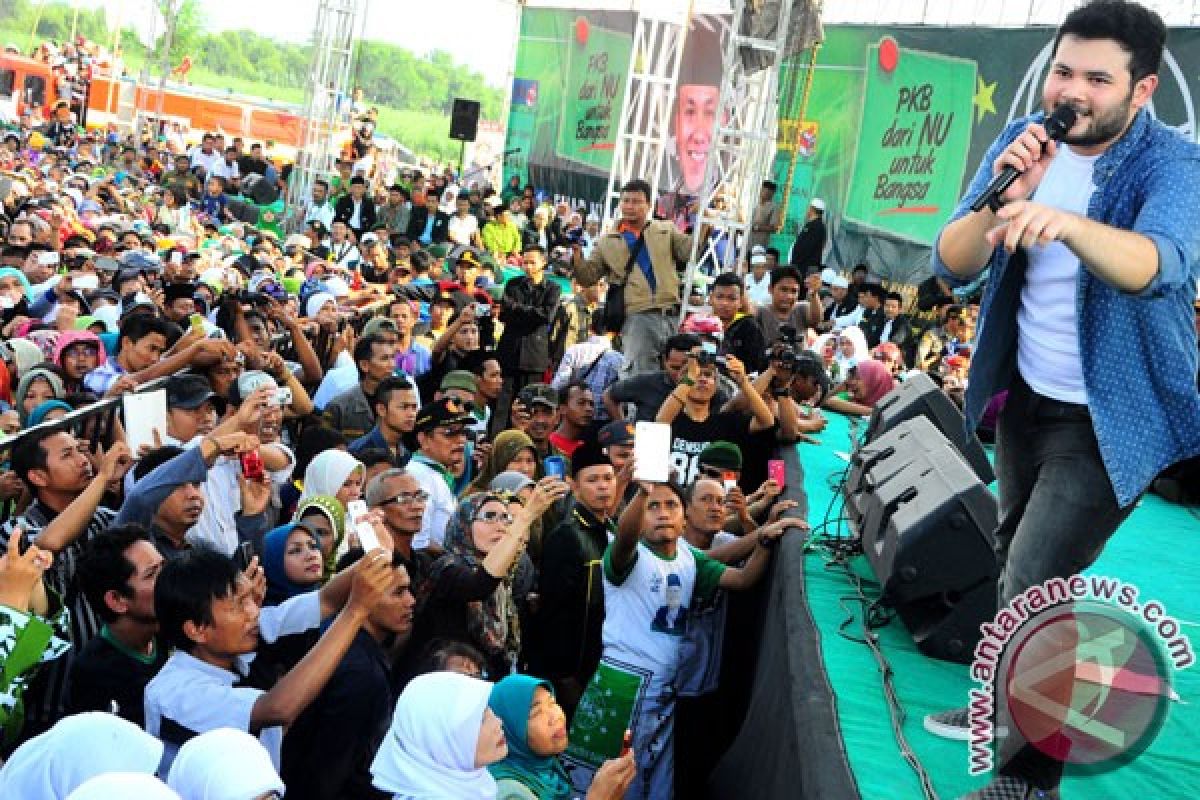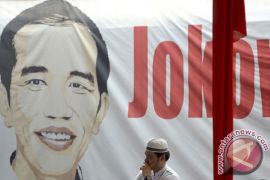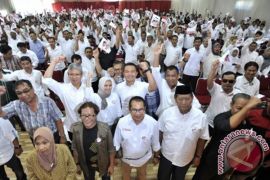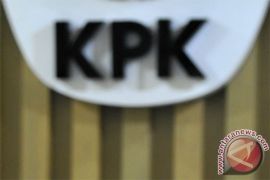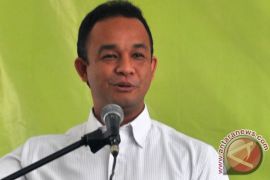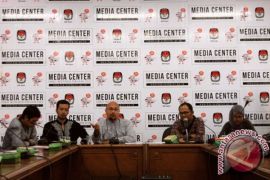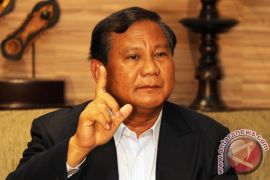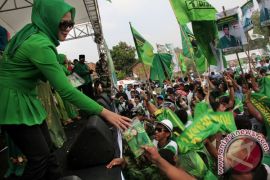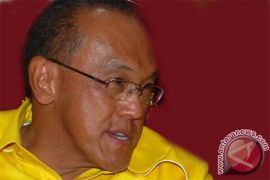The party electability surveys, in fact, served as "warning" or a "wake-up call" to some Muslim voters to "return to religion".
A number of eligible voters, who were used to being floating voters or initially decided to be absent from elections, finally turned out at the polling stations to cast their votes for Islamic-based parties, which had been foreseen to perform very badly in the 2014 legislative elections. It was even worse as some of them were expected to be out of the parliament because they lacked the stipulated number of votes.
The United Development Party (PPP)s general chairman Suryadharma Ali when visiting Medan, North Sumatra, in March 2014, called upon the Muslim people to unite, as he was concerned about the bleak prospects portrayed in party electability surveys.
"This could be our moment," he announced, reminding that the parliamentary threshold for the legislative elections this year had been set at 3.5 percent, so if parties fail to meet it, they will have to drop out.
It would be ironic if Islamic-based parties were sidelined in the national politics of Indonesia, which has a Muslim majority, Ali, concurrently the religious affairs minister, declared in front of a number of Muslim clerics.
"I will go to polling station and cast my vote for Islamic-based parties because I dont want to see that this would be the end of the parties," Abdullah, a Jakarta resident, confirmed in the morning of the parliamentary election day.
Two residents of Bekasi district, Umi and Dini, also decided to go to the polling station to cast their votes for Islamic-based parties. "I dont care which party, so long as they are Islamic based," Umi admitted on April 9.
Muslim voters do condemn several leadership members of Islamic-based parties for their involvement in corruption cases currently being handled by the Corruption Eradication Commission (KPK).
But they believe that Islamic-based parties still need to have seats in the parliament to guard aspirations that are in line with Islamic teachings.
It seemed, however, such a kind of sentiment was forgotten or underestimated. Ray Rangkuti, from "the Lingkar Madani untuk Indonesia" (LIMA), prior to the legislative elections, stated that the appeal of religious-based parties have long been static, as electability surveys indicated them receiving only five percent of votes.
"I think their supporters are their fixed voters, while there are no voters from outside, and therefore their vote totals never increase," he explained.
A political communication expert from Paramadina University, Hendri Satrio, before the election day, noted that it was not surprising that religion-based parties would not have much say in the elections, since these parties have never made breakthroughs and do not have strong leaders.
"Their performance was flat when they were in the government. Also, they have only conducted local and exclusive political communications within their bases," he pointed out.
A party electability survey conducted by Kompas in January, predicted that the National Awakening Party (PKB) to get 5.1 percent, the Prosperous Justice Party (PKS) 2.3 percent, the National Mandate Party (PAN) 3.2 percent, and the United Development Party (PPP) 2.4 per cent.
Lingkaran Survei Indonesia (LSI)s polls in February, showed PKS to collect only 2.2 percent, PKB 3.7 percent, PPP 3.6 percent, PAN 3.3 percent, PKS 2.2 percent, and the Star and Crescent Party (PBB) 0.7 percent. LSI researcher Adjie Alfarab explained that the error range of the survey was between 2.9 percent and 30.1 percent from 1.2 thousand respondents who had not decided on their choices.
The Indonesia Network Elections Survey (INES) predicted that the vote percentage of PPP would be 3.6 percent, PAN 2.6 percent, PKB 2.6 percent, PKS 2.1 percent, and PBB 1.2 percent.
In the 2009 parliamentary election, the Democratic Party (PD) won 20.85 percent of the total votes, Golkar Party 14.45 percent, PDIP 14.03 percent, the Justice and Prosperous Party (PKS) 7.88 percent and the National Mandate Party (PAN) won 6.01 percent.
The parliamentary threshold requirement for the 2014 elections has increased from 2.5 percent in 2009 to 3.5 percent of total national votes. In order to qualify as a minimum-winning coalition eligible for presidential contention, a total of 25 per cent of total national votes or a minimum of 20 percent of the 560 seats contested in the House of Representatives (DPR), are required.
Although the official result of the legislative elections will be announced by the General Elections Commission (KPU) on May 7 and 9, quick vote counts by various survey institutions had shown that none of the political parties had secured 25 percent of the votes.
The quick vote count by the Indonesia Survey Institute (LSI) on the April 9 elections placed the PDIP in the first position, winning 19.77 percent of the votes, followed by the Golkar Party with 14.61 percent, the Great Indonesia Movement (Gerindra) with 11.80 percent and the ruling Democratic Party (PD) in the fourth place with 9.73 percent.
The fifth position was won by PKB by securing 9.07 percent of the votes, followed by PAN in the sixth position with 7.47 percent, PPP in the seventh place with 7.08 percent, PKS in the eighth place with 6.61 percent, the National Democrat Party (Nasdem) with 6.77 percent, the Peoples Conscience Party (Hanura) with 5.26 percent, PBB with 1.36 percent and the Indonesian Prosperous and Unity Party (PKPI) with 0.97 percent.
Collectively, based on the unofficial quick count, the Islamic-based parties - PKB, PAN, PPP, PKS, and PBB won about 32 percent, relatively much higher than 20 or less predicted by preliminary electability polls.
During Indonesias first democratic elections in 1999, Islamic-based parties collectively won 36 percent of the popular vote. The collective showing of Islamic-based parties dropped to 28 percent in 2009, from 38 percent in 2004.
By law, a political party was required to win at least 25 percent of the total votes or a minimum of 20 percent of the 560 seats contested in the House of Representatives (DPR) before it can nominate its presidential candidate for the presidential election, which is scheduled to be held on July 9.
Therefore, according to Islamic political observer Dr Yon Mchmudi of the University of Indonesia, Islamic parties have the chance to form a strong coalition and to nominate a presidential candidate for the presidential race.
"The Islamic-based parties such as the National Awakening Party (PKB), the National Mandate Party (PAN), the Prosperous Justice Party (PKS) and the United Development Party (PPP) have the potential to become an alternative force," he assessed recently.
But, in reality, it would be difficult because the parties are not united despite sharing the same ideology, and they do not have a strong figure fro nomination.
Thanks to their surprisingly good performance, the Islamic-based political parties will be in demand, as major parties, who failed to meet the 25 percent threshold, have to seek a political coalition to nominate presidential candidates, according to Shohibul Anshor, a political expert from North Sumatra.
The so-called nationalist and secular parties, such as the PDIP, the Golkar, and the Gerindra, need to coalesce with Islam-based parties in the next presidential election to meet the threshold, he pointed out.
(f001/INE/f001)
EDITED BY INE
(F001/KR-BSR/H-YH)
Reporter: Fardah
Editor: Jafar M Sidik
Copyright © ANTARA 2014
